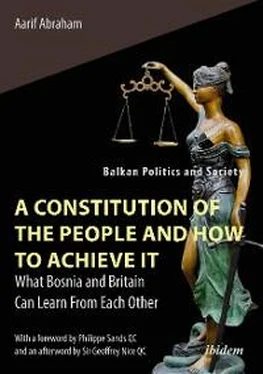In Bosnia, informed public participation and deliberation in a constitutional design process, on a fixed and repeated basis, with some procedural safeguards, could introduce a flexibility in political life in Bosnia that was, perhaps still is, present in long-evolved democratic polities like Britain. The capacity to change the constitution every new generation (a ‘revolving constitution’) could allow, with careful calibration, the possibility of catalysing evolutionary outcomes in the short run. Britain itself may be reminded of its own tradition.
Unlike Britain, Bosnia cannot afford to wait to evolve towards a new constitutional settlement. One unfortunate and very real pathway out of the current deadlock in Bosnia is collapse and the other is a return to violent conflict. If the people in Bosnia are much more accommodating than the ethno-nationalist political elites representing them, then the presumption upon which the current constitutional arrangements were built were incorrect. Furthermore, that presumption has helped to perpetuate a collective socio-economic and political malaise from which there is, seemingly, no escape. 17
This book’s suggestions for reform are predicated on the fact, as demonstrated, that the people are accommodating, human rights oriented and tolerant. The political culture of the people in Bosnia is conducive to democratic reform. It is, contrary to popular opinion, open to popular participation and retains the capacity for inter-ethnic cooperation and engagement. One of the tests for this claim is whether or not there is evidence proving that political culture in Bosnia is as democratic as its close EU neighbours’ culture. If so, the second test is whether both Bosnia and Britain respectively have political cultures conducive to greater democratic participation. If they do not, then surely this needs immediate and critical attention. If they do, then the objective is to introduce context and an ear for justice into fixed and rigid legalistic constitutional documents by involving the people in key constitutional decisions. 18The aim, ultimately, is to reorient political life towards an inherently democratic political culture.
The current debate in Bosnia is on reforming the content of the constitution by tweaking or changing specific constitutional provisions. The paradox is that reform continues to be unlikely given the special constitutional guarantees accorded to the three constituent peoples. There are few incentives for political elites to compromise their intransigent positions. If anything, the reality is the opposite. Any attempt at reform by one group of elites is seen as an attempt to undermine one group at the expense of the other (at least that is how ethno-nationalist leaders present proposals for reform to their respective ethnic constituencies). It is a classical “beggar thy neighbour” problem. Political elites explain that this conflict, and their own intransigence, is because of the political culture. They claim to behave as they do in the name of ‘their people’ in their respective Bosniak, Bosnian Croat and Bosnian Serb electoral silos. The irony is that the electoral silos correspond closely to ethno-territorial silos created by ethnic cleansing during the war. The same people indicted for international crimes, as a result of responsibility for the ethnic cleansing, were the principal negotiators of the Bosnian constitution. 19
It has been taken for granted, by political commentators and academics alike, that conflict between elites in the constitutional structures of Bosnia is a mirror reflection of the latent desire for conflict within the population-at-large. The people of Bosnia are characterised as anti-democratic and pro-ethno-nationalist. Political apathy and deadlock within State institutions, therefore, are held to be a consequence of a lack of citizen initiative and will. A lack of will that emanates from an apparently intrinsic, non-participant political culture.
But this narrative is not supported by Bosnia’s variegated, multi-ethnic and thousand-year history. For much of their history, the Bosnian people have come under the strong influence of foreign powers depriving them of agency. Despite that, Bosnian history is, in fact, predicated on participation, accommodation and tolerance. This book will seek to show that the contrary view is not supported by the evidence including data relating to people’s political preferences since at least 1992. If the people are momentarily apathetic, intransigent, or intolerant, this is because that orientation is a consequence of the war rather than being endemic to the political culture. Later that orientation has been strengthened directly by the constitutional structure agreed—or rather imposed—by the Dayton Peace Agreement. Either way, this Dayton-driven emanation of poor political participation has no reason to remain fixed or unchanging. There is always a possibility for change where there is the capacity, as there is in Bosnia. Such change is imperative before it is too late.
The example of Bosnia is of immediate significance to the British constitution. The constitution of the former provides a cautionary lesson that written codification, federalisation and entrenchment of some rules above others cannot be, in and of itself, a panacea. This book considers whether the lesson from Bosnia is that misunderstanding political culture, ignoring the preferences of people in all their manifestations, and imposing rather than agreeing constitutional arrangements will simply lead to failed institutions and instability.
There is no doubt that dissatisfaction exists in Britain. Dissatisfaction is prevalent among the devolved powers, among the regions, among the haves and have-nots, in the quality of political elites, and in the manner in which political elites carry out their duties and how they are elected (or not, as in the case of the House of Lords—Parliament’s upper chamber). There is a clear need for something other than the status quo to address constitutional issues in Britain outside the day-to-day of parliamentary politics. The classic British fudge, muddling through with partisan, ad hoc, changes to its constitution are not sustainable. The underlying constitutional issues have precipitated many crises and have resulted in attacks on judges by the media and the executive. The executive has failed to understand the significance of fundamental unwritten rules and practices and the consequences of attacking them for short-term political gain. With a rise of nationalism, different political parties, have precipitated centrifugal and centripetal forces which wrestle with secession from the Union, or, on the contrary, further centralisation. Meanwhile, there are calls for a reassertion of nativism, originalist or ‘orthodox’ (depending on your view) interpretations of people’s fundamental rights. These calls compete against international norms that Britain is bound faithfully to interpret, apply and fulfil either by treaty or custom.
This book demonstrates that, when it comes to constitutional issues, there is a significant discrepancy between the preferences of the elites and those of the people in both Britain and Bosnia.
In Bosnia, constitutional structures, when combined with the legacy of the war, have tended to favour the election of ethno-nationalist elites. The Bosnian constitution, and by extension its institutions, is the most significant impediment to the bridging of societal divides. Its reform, therefore, must be the priority. But such reform must have a popular mandate. Elites, isolated from the people, 20are unable and/or unwilling to undertake reform that is conciliatory, moderate and accommodating. These elites are seemingly locked in revolving doors without an exit. Using adaptations from game theory (mechanism design and implementation theory) and behavioural economics (prospect theory) a ‘revolving constitution’ is proposed to break the impasse. A revolving constitution would subject parts of the constitution—as opposed to ordinary legislation—to greater civic participation and input (through, referendums, civic initiatives and deliberative assemblies) on a fixed basis every new generation. 21Fixed and repeated interaction between elites and the people would introduce a flexibility and democratic legitimacy into political life that is currently lacking these characteristics. A widely agreed constitutional covenant would ensure such a process would be transparent, properly institutionalised, and contain procedural safeguards. These safeguards would ensure no one is cut out of the process or that current arrangements are not simply torn-up by one group. This can be achieved with: rules requiring joint and concurrent referendums in all significant entities, municipalities and cantons; civic initiatives that cut across ethnic lines; and inclusive constitutional conventions for deliberation. With these safeguards, it is clear that the people and elites would be no worse off than under the status quo; even if the people might be as intransigent as elites. A revolving constitution would guarantee that the outcomes of reform would accord with the median or average voter. Elites in the constitutional reform space, currently interacting only with each other in the parliamentary or presidential arena, would be incentivised or ‘nudged’ towards considering the preferences of the people in the electoral arena. 22If the people are just as intransigent as the elites then current constitutional arrangements will remain in place. If it is true, however, as the evidence suggests, that the people are more accommodating than political elites then regular interaction between elites and the people can lead to far greater constitutional change than is currently possible and a far greater likelihood of accommodating behaviour amongst elites. The revolving constitution can help publicly manifest the underlying political culture of the people: democratic, tolerant and accepting.
Читать дальше












